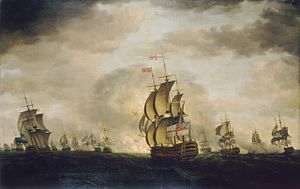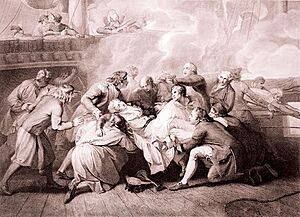HMS Resolution (1770) facts for kids

Battle of Cape St Vincent
|
|
Quick facts for kids History |
|
|---|---|
| Name | HMS Resolution |
| Ordered | 16 September 1766 |
| Builder | Deptford Dockyard |
| Laid down | July 1767 |
| Launched | 12 April 1770 |
| Honours and awards |
|
| Fate | Broken up, 1813 |
| General characteristics | |
| Class and type | Elizabeth-class ship of the line |
| Tons burthen | 161211⁄94 (bm) |
| Length |
|
| Beam | 46 ft 11 in (14.3 m) |
| Depth of hold | 19 ft 9 in (6.0 m) |
| Propulsion | Sails |
| Sail plan | Full-rigged ship |
| Armament |
|
HMS Resolution was a powerful warship of the Royal Navy. It was a "74-gun third-rate ship of the line." This means it was a large ship with 74 cannons. It was built in 1770 and had a crew of 600 sailors. Resolution was one of the biggest ships in the Royal Navy. It fought in many important sea battles.
Contents
Resolution's Exciting Battles
Resolution was a very active ship. It took part in a special event called the Spithead review in 1773. This was a parade of naval ships.
Key Sea Fights
The ship fought in several major battles. These included the Battle of Cape St. Vincent (1780) and the Battle off Halifax (1780). It also saw action in the Battle of the Chesapeake in 1781. Another important battle was the Battle of Fort Royal in 1781.
The Battle of the Saintes
One of its most famous battles was the Battle of the Saintes in 1782. During this battle, Resolution was led by Lord Robert Manners. Sadly, Lord Manners was badly hurt in the battle. He passed away on his way back to England.
Later Years of Service
Later in its life, Resolution continued to serve. It was part of the Battle of Copenhagen (1807). It also fought in the Battle of the Basque Roads in 1809. In the same year, it joined the Expedition to the Scheldt. This was a large military operation.
Resolution was finally taken apart in 1813. This marked the end of its long and busy career.
Famous Commanders of Resolution
Many skilled captains commanded HMS Resolution during its time. Here are some of the notable ones:
- Captain William Hotham (1770 to 1773)
- Captain Chaloner Ogle (1775 to 1780)
- Lord Robert Manners (1780 to 1782)
- Sir James Wallace (briefly in 1782)
- Captain William Lechmere (1797-1798)
- Captain Alan Hyde Gardner (1799 to 1802)
- Captain George Burlton (1806 to 1809)
 | Precious Adams |
 | Lauren Anderson |
 | Janet Collins |


